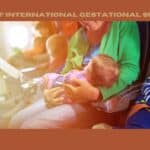
The practice of surrogate motherhood is as ancient as the hills. For centuries we can find stories of women having babies for other women. Until recently, surrogacy has mostly been seen as one solution to help infertile couples have that child of their own. But today, surrogacy is sometimes practiced to allow the full time career woman to not have to interrupt her career for pregnancy and maternity leave. And in some extreme cases, surrogacy is chosen to avoid the ‘hassle’ of wear and tear on the woman’s body. I remember one Law and Order show which highlighted a wealthy woman who hired a poor woman to bear her child just so she wouldn’t have to endure morning sickness, stretch marks and unwanted weight gain. These are cases of surrogacy for convenience sake. But wherever and whenever surrogacy is practiced you can be sure of three things. First, money is involved. And sometimes lots of it. Second, legal battles are typically part of the landscape. The legal battles are often quite messy as couples and individuals battle over who rightfully and legally and ethically should be the parents. Whose baby is it? And finally abuses are rampent. Especially as it relates to exploitation of poor women by the wealthy. Some countries have laws against surrogacy. Sweden, Spain, France and Germany for example do not allow surrogacy because of the complex problems that can arise. Of course, when things go bad, the child is always caught up in the middle of those so desparate to have a child at any cost. And that we can count on. Babies and miracles? It depends on who you ask.
Author Profile

- Jennifer Lahl, MA, BSN, RN, is founder and president of The Center for Bioethics and Culture Network. Lahl couples her 25 years of experience as a pediatric critical care nurse, a hospital administrator, and a senior-level nursing manager with a deep passion to speak for those who have no voice. Lahl’s writings have appeared in various publications including Cambridge University Press, the San Francisco Chronicle, the Dallas Morning News, and the American Journal of Bioethics. As a field expert, she is routinely interviewed on radio and television including ABC, CBS, PBS, and NPR. She is also called upon to speak alongside lawmakers and members of the scientific community, even being invited to speak to members of the European Parliament in Brussels to address issues of egg trafficking; she has three times addressed the United Nations during the Commission on the Status of Women on egg and womb trafficking.
Latest entries
 infertilityApril 23, 2024The Rise of International Gestational Surrogacy in the U.S.
infertilityApril 23, 2024The Rise of International Gestational Surrogacy in the U.S. Assisted Reproductive TechnologyApril 16, 2024Founder Jennifer Lahl’s Speech on Surrogacy to the Casablanca Declaration
Assisted Reproductive TechnologyApril 16, 2024Founder Jennifer Lahl’s Speech on Surrogacy to the Casablanca Declaration #BigFertilityFebruary 27, 2024No, Alabama Didn’t Ban IVF
#BigFertilityFebruary 27, 2024No, Alabama Didn’t Ban IVF ArticleSeptember 25, 2023The Little Engine That Could
ArticleSeptember 25, 2023The Little Engine That Could

